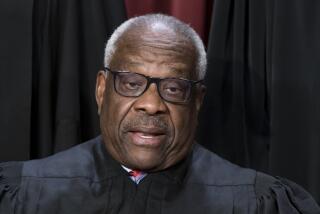Breyer Digs at Elite Image as Hearings Start
- Share via
WASHINGTON — Three times during the first hour of hearings Tuesday, the Senate Judiciary Committee heard that Supreme Court nominee Stephen G. Breyer had dug ditches for the Pacific Gas & Electric Co. as a summer job.
He also mixed salads at a camp run by the city of San Francisco, it was revealed. And he was no bookworm as a child. “My ideas about people do not come from libraries,” Judge Breyer told the panel.
As hearings opened on President Clinton’s second nominee to the high court, both Breyer and his White House backers sought to wipe away the image of the 55-year-old judge as a Harvard-educated elitist with a theoretical approach to the law.
Instead, they stressed that he is a practical man in touch with real people.
“Above all,” he said, “I will remember that the decisions I help to make will have an effect upon the lives of many, many Americans.”
Breyer’s bit of image-making came during a smooth opening day in which the nominee moved quickly to quell any remaining controversy standing in the way of his confirmation.
In opening comments, he announced that he would divest himself of holdings in insurance companies to head off further concerns about a possible conflict of interest.
During the 1980s, Breyer, a multimillionaire, had invested heavily in Lloyd’s of London, the international insurer of last resort. In several cases that came before the U.S. Court of Appeals in Boston, Breyer wrote opinions that limited the liability of companies for cleaning up pollution and questions were raised whether these rulings could ultimately benefit Lloyd’s.
But White House officials pointed out that none of Breyer’s holdings in Lloyd’s were directly affected by those rulings. They also released letters from three experts in legal ethics who had reviewed the matter and concluded that Breyer did not err. Judges are not required to step aside, they said, simply because of a “speculative” chance that their investments could be affected by a ruling.
Breyer’s attempt to polish his image came as no surprise.
Three years ago, Judge Clarence Thomas went before the committee and followed what his advisers called the “Pinpoint strategy.” He spoke repeatedly of growing up poor in Pinpoint, Ga.
*
Last year, Judge Ruth Bader Ginsburg told of how she had been denied entry jobs as a lawyer because she was a woman. She then became a pioneering lawyer on behalf of women’s rights.
But Breyer’s life does not readily make for a hard-luck story. The son of a San Francisco lawyer, young Breyer was a brilliant student who excelled at Stanford, Harvard and Oxford. He married into a wealthy English family and he and his wife, Joanna, list assets valued at more than $6.3 million.
Short, slight and balding, the judge seemed dwarfed when seated between Massachusetts Sens. Edward M. Kennedy and John Kerry as the hearing began.
But given a chance to speak, he adroitly answered questions without provoking controversy. He won warm praise from several senators, especially from the committee’s Republicans, who recalled his intelligence and fairness during the two years, 1979-80, that he served as the panel’s majority counsel.
Still, the up-from-the-ditches portrayal of Breyer did not succeed entirely in dispelling his elite image.
His Senate supporters could not resist pointing out that Breyer is “trilingual” and in his spare time likes to read novelist Marcel Proust “in the original French.”
Breyer apologized on occasion for lapsing into his “professorial mode” when he answered a simple question with a lecture.
Tuesday’s session had none of the drama or tension of past confirmation hearings, largely because Breyer came unopposed. And since he has written little on constitutional law, he easily skirted the questions that touched on controversies.
He did, however, reveal his views in several areas:
* He said that both the right to abortion established in the Supreme Court’s Roe vs. Wade decision and the constitutionality of the death penalty are matters of “settled law,” meaning that they are no longer in legal dispute.
* Asked about the First Amendment’s ban on “an establishment of religion,” Breyer said: “First, I think of Jefferson and the wall.” That comment will not rest well with conservatives such as Chief Justice William H. Rehnquist, who has derided Jefferson’s view that the Constitution erects a “wall of separation between church and state.”
The panel expects to continue the hearing today and Thursday.
More to Read
Get the L.A. Times Politics newsletter
Deeply reported insights into legislation, politics and policy from Sacramento, Washington and beyond. In your inbox twice per week.
You may occasionally receive promotional content from the Los Angeles Times.











